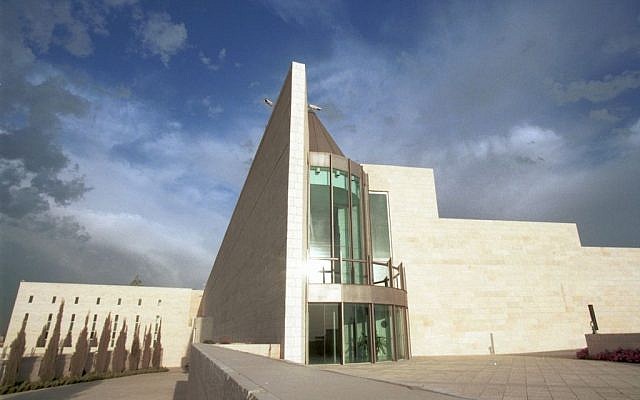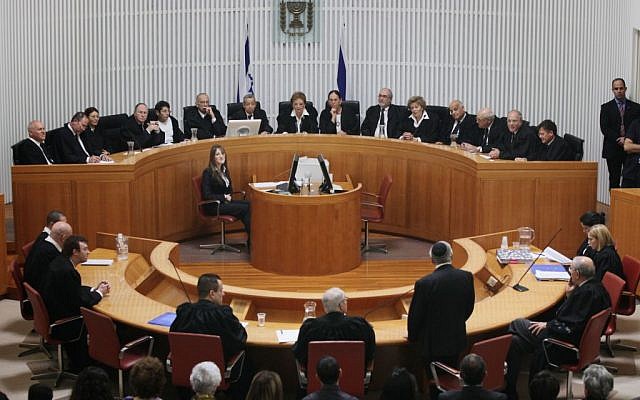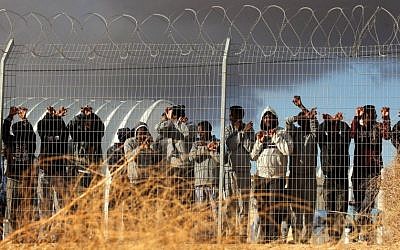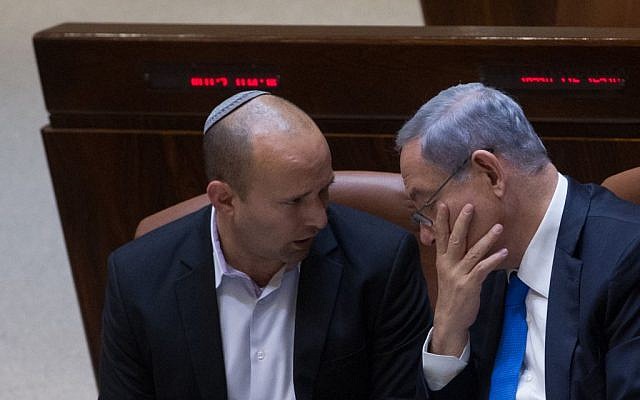Even as it garners opposition, Jewish Home leader says bill allowing Knesset to override court represents his party’s biggest achievement: pushing Netanyahu to the right

Criticism of the burgeoning proposal to curtail the power of the Supreme Court, which received initial approval earlier this month, has been visceral and widespread, with detractors across the board warning the legislation would remove vital checks and balances and move Israel a step closer to the end of its fragile democracy.
From the opposition, Zionist Union leader Avi Gabbay said the bill to give MKs the ability to overturn a Supreme Court decision to strike down Knesset legislation would turn Israel into “Erdogan’s Turkey,” a reference to Ankara strongman Recep Tayyip Erdogan’s crackdown on state institutions. Yesh Atid chairman Yair Lapid said the it would mean the public no longer had any recourse “against the tyranny of the government.” Meretz’s Tamar Zandberg said it would destroy the principles of Israel’s Declaration of Independence.
Even Kulanu party chairman Moshe Kahlon, a member of the ruling coalition, said the legislation would “damage the rule of law,” and vowed “not let extreme factions dictate the agenda of the state of Israel.”
But Jewish Home leader and Education Minister Naftali Bennett — the champion of the bill and therefore the target of Kahlon’s acrimony — remains unmoved by warnings of a threat to democracy. Far from its end, he said in a tweet moments after the Ministerial Committee for Legislation voted to back the bill, its passage would be “a great day for Israeli democracy.”
If anything is undemocratic, it’s the Supreme Court, whose members are picked, not elected, and which has become too activist in its ruling, Bennett charged recently, speaking to The Times of Israel in his Jerusalem office in the Education Ministry.
Reining in the authority of the Supreme Court would improve Israeli democracy by giving power to public, with whom it should rightfully reside, Bennett said.
“The Supreme Court has basically turned itself into the sovereign, the highest authority on everything. That’s not what they’re supposed to do. They’re not supposed to govern. We’ve been elected. They have not,” he said of the government he sits in, describing it as the true arbiter of the will of the people and arguing that the court’s judges are unrepresentative of Israeli society.
“The Supreme Court over the last 25 years has encroached on the government’s authority time and again,” Bennett charged.

Right-wing politicians in Israel have long sought to limit the Supreme Court, which is among the most powerful in the democratic world and under Bennett’s leadership, the Jewish Home party, which holds the justice portfolio, has campaigned for clipping the wings of what it regards as an overly liberal court.
According to Bennett, the court’s powers, which have grown over the years, have no clear constitutional basis and have enabled it to favor liberal policies and minority rights over the desires of the voting majority. Israel has no constitution, but jurists have ruled in the past that its set of Basic Laws essentially act as one.
“It has intervened in areas where it should not intervene,” he said. “Again and again, it’s butting in issues that it just shouldn’t.”
The Supreme Court’s interventionist approach — with its strong emphasis on protecting minority rights – was pioneered by Aharon Barak, who served as the court’s president (the Israeli equivalent to chief justice) between 1995 and 2006. Controversially, Barak decreed the “blue pencil” principle according to which judges possess a line-item veto over legislation, and can strike down individual articles or words contained in legislation.
Since then, the court has upheld the tradition of judicial activism, remaining at the center of Israeli public debate and making it a lightning rod for right-wing critics.
The court’s defenders say that in Israel’s fractious society, where the Knesset frequently shirks its responsibility to protect religious pluralism, civil liberties and the rights of Palestinians, the court has no choice but to fill the moral and legal vacuum. Maintaining an independent judiciary, they say, serves as a counterweight against the danger that a “tyranny of the majority” tramples the rights of those who are not properly represented by the political system.
For Bennett, that counterweight has gotten too heavy.

“We need checks and balances, but the checks and balances are not balanced. We need to rebalance that very sensitive area,” he said emphatically.
While declining to give examples, the Jewish Home leader admitted that there are times when the court should be able to strike down legislation to protect minority rights.
“But,” he stressed, “the Supreme Court is not a higher authority than government to say, ‘We think this decision is not good enough, so we’ll overturn your decision.’”
Yet, laments Bennett, “They do it again and again.”
Beyond their role as the nation’s highest appeals court, the Supreme Court justices also sit as the High Court of Justice, a court of equity to which anyone affected by any state institution may appeal in real time. The High Court, known by the acronym “Bagatz” in Hebrew, has struck down entire laws and stopped military battles in mid-stride. And the High Court has ventured, albeit often grudgingly, into very controversial questions of national identity, such as the recognition of conversions of liberal Jewish streams for the purposes of immigration, or the right of small communities to limit their membership to their own narrowly defined ethnic or religious subgroups.

The issue came to a head in recent months with the political dispute over efforts by the government to deport tens of thousands of African asylum seekers, possibly to countries deemed unsafe, and to incarcerate many of those refusing deportation.

The Supreme Court has repeatedly overturned the government’s policy of holding illegal migrants from Africa for up to three years in effective detention while their refugee status is determined, sparking the ire of the political right, including Bennett and his party faithful.
The Jewish Home proposal, known as the “override clause” would give 61 MKs (of the 120 MKs) the ability to overturn a Supreme Court decision to strike down Knesset legislation as unconstitutional. As part of removing the court’s effective veto power, in the short term, it would enable lawmakers to change the law in ways that would allow Israel to go ahead with deportations of African asylum seekers.
“We’re the guys held accountable for policy, for delivering, for economy, for all aspects of life. That’s what government is about. They are not accountable!” Bennett declared, rankled for a moment.
Ultimately, he said, the bill would “increase the ability of the government to govern.”
That ability might not come around just yet.
Despite passing the key ministerial vote this month, the bill’s advancement has since been stalled by disagreements among coalition partners and Prime Minister Benjamin Netanyahu has accused Bennett of “pushing the override clause into the garbage can,” by demanding it move forward immediately without full coalition support.
For Bennett, however, getting to this point is already a victory and represents what he describes as his party’s biggest achievement in its five years as a junior coalition partner: pushing the government, and particularly Netanyahu, to the right.

“Before we came in 2013, Netanyahu was a two-stater who released over 1,000 terrorists [as part of the 2011 deal with Hamas to ensure the release of captured soldier Gilad Shalit] and who let the activists in the judicial system run amok. Then when I came, it all changed,” Bennett said, referring to his party’s entry into the coalition after elections that year.
While Netanyahu has given mixed messages on the Supreme Court bill, “he’s talking about checks and balances on the judicial system, something he never touched for the past 22 years.”
“I think to a great degree, my job is, as long as Bibi is around, to be his spine.” Bennett smiled, making sure that the reference to those criticizing the bill was not lost. “A spine of steel, to make sure he doesn’t cave in.”
As reported by The Times of Israel
